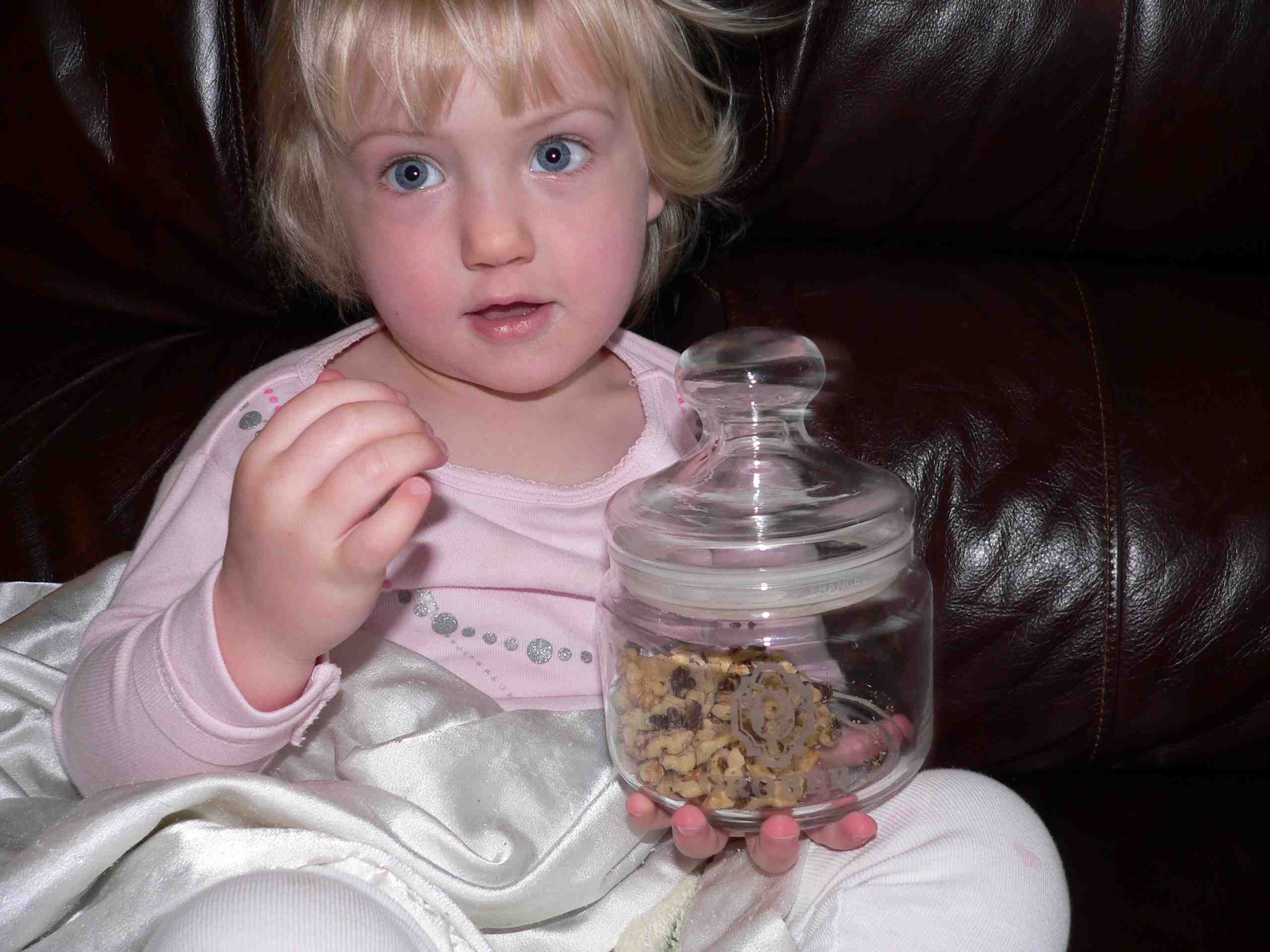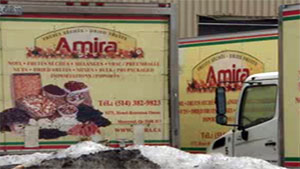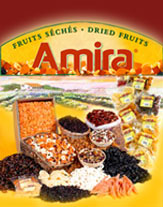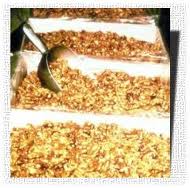I generally buy walnuts in a plastic bag, already shelled. Once home, they go into a glass container where I’ll grab a few while puttering in the kitchen, or toss some on a salad, or into Amy’s oatmeal cookies or fiber-brownies (right, displayed this morning by daughter Sorenne).
When the E. coli O157:H7 outbreak in walnuts was first announced, early on April 4, 2011, the Canadian Food Inspection Agency said people were sick but wouldn’t  say how many while fingering walnuts imported from California and imported by Amira Enterprises of St. Laurent, Quebec as the suspected source.
say how many while fingering walnuts imported from California and imported by Amira Enterprises of St. Laurent, Quebec as the suspected source.
Later on April 4, 2011, the Public Health Agency of Canada issued its own statement, saying 13 were sick and that “consumers who have raw shelled walnuts in their home can reduce the risk of E. coli infection by roasting the walnuts prior to eating them. Consumers should place the nuts on a cooking sheet and bake at 350°F for 10 minutes, turning the nuts over once after five minutes.”
Sorenne won’t be doing that.
At the time I noted this advice does not account for the risk of cross-contamination with a virulent pathogen and that my microbiology friends look forward to testing it out.
On April 7, 2011, Quebec health types confirmed the death of one person linked to the walnuts and a spokesthingy said, "The Canadian Food Inspection Agency has serious doubts as to whether the infections are related to walnuts, but it’s the most probable source.”
(Are you getting a sense of how well single-food inspection agencies work?)
Late last night, PHAC issued another statement, saying there were 14 people sick in Quebec, Ontario and New Brunswick, including 10 hospitalizations, 3 cases of hemolytic uremic syndrome, and one death.
The PHAC statement emphatically states:
“If you have these products in your home, don’t consume them.”
.jpg) But then goes on to less emphatically state,
But then goes on to less emphatically state,
“Until further notice, consumers who have raw shelled walnuts in their home can reduce the risk of E. coli infection by roasting the walnuts prior to eating them. Consumers should place the nuts on a cooking sheet and bake at 350°F for 10 minutes, turning the nuts over once after five minutes. Wash your hands and cooking utensils thoroughly after handling the walnuts.”
So PHAC added a washing recommendation in recognition of cross-contamination risks.
This is sorta hopeless. Throw any suspect walnuts out and don’t underestimate the risk of cross-contamination.
PHAC then ritually stated how people should cook meat to the proper internal temperature, wash fresh fruits and vegetables before eating them, clean counters and cutting boards and wash your hands regularly.
Sorenne wonders what this has to do with walnuts.
Public Health Agency of Canada, with all your salaries and collaborating bureaucrats, why are you so terrible at talking about food safety (see anything related to PHAC and listeria, 2008).
Consumers are not the critical control point (CCP) for walnuts sitting in a jar at home.
(1).jpg) may be associated with this outbreak and to confirm the source of the outbreak. PHAC will provide updated information as the outbreak investigation progresses."
may be associated with this outbreak and to confirm the source of the outbreak. PHAC will provide updated information as the outbreak investigation progresses."
 foods from "farm to fork" and a lack of incentives to keep food safe along the "farm to fork" pathway."
foods from "farm to fork" and a lack of incentives to keep food safe along the "farm to fork" pathway.".jpg) perfect. There’s no zero risk. But I’m not aware of any study that demonstrates in any persuasive way that any country has a better food inspection system than Canada.”
perfect. There’s no zero risk. But I’m not aware of any study that demonstrates in any persuasive way that any country has a better food inspection system than Canada.”.jpg) wouldn’t be surprised if it turns out walnuts aren’t to blame for an outbreak of E. coli in three provinces.
wouldn’t be surprised if it turns out walnuts aren’t to blame for an outbreak of E. coli in three provinces..jpeg) still on store shelves in Montreal.
still on store shelves in Montreal.
 say how many while fingering walnuts imported from California and imported by Amira Enterprises of St. Laurent, Quebec as the suspected source.
say how many while fingering walnuts imported from California and imported by Amira Enterprises of St. Laurent, Quebec as the suspected source..jpg) But then goes on to less emphatically state,
But then goes on to less emphatically state, walnuts distributed by Quebec-based Amira Enterprises.
walnuts distributed by Quebec-based Amira Enterprises. website which stated they import specialty food products from Egypt, Lebanon, Syria, Turkey, Saudi Arabia and Iran.
website which stated they import specialty food products from Egypt, Lebanon, Syria, Turkey, Saudi Arabia and Iran.
 some international
some international .jpg) Lebanon, Syria, Turkey, Saudi Arabia or Iran, the places from where the fingered distributor, Amira Enterprises Inc. of St. Laurent, QC, imports things like walnuts.
Lebanon, Syria, Turkey, Saudi Arabia or Iran, the places from where the fingered distributor, Amira Enterprises Inc. of St. Laurent, QC, imports things like walnuts. shelled walnut products described below because these products may be contaminated with may be contaminated with E. coli O157:H7.
shelled walnut products described below because these products may be contaminated with may be contaminated with E. coli O157:H7.  That’s helpful for consumers.
That’s helpful for consumers..jpg) government — that helped contribute to a listeriosis outbreak in 2008 that left 22 Canadians dead.
government — that helped contribute to a listeriosis outbreak in 2008 that left 22 Canadians dead..jpg) that serves the Prime Minister
that serves the Prime Minister .jpg) The handwritten notes were not released to The Canadian Press until February this year — 28 months after the original access request was made.
The handwritten notes were not released to The Canadian Press until February this year — 28 months after the original access request was made.